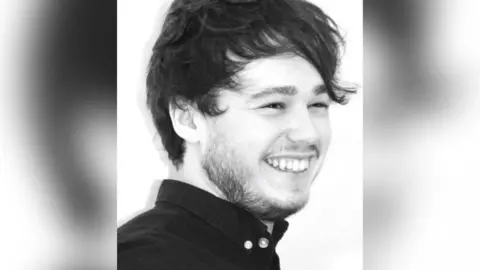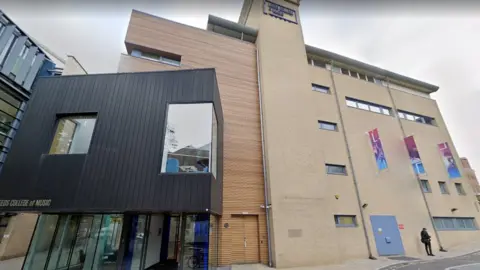Bradford musician's death could not be prevented - coroner
 ISON HARRISON
ISON HARRISONA young musician's death from epilepsy could not be prevented, a coroner said, although he raised concerns over how patients were advised of the condition.
Peter Doody, 21, died from a condition known as SUDEP, or sudden unexpected death in epilepsy, at his parents' home in Wyke, Bradford, in 2019.
His parents have since campaigned for healthcare staff to warn patients with epilepsy about the risks of SUDEP.
Assistant Coroner Ian Pears said trusts involved had followed guidelines.
Mr Doody had been diagnosed with temporal lobe epilepsy at the age of 17 and was initially cared for by Calderdale and Huddersfield NHS Foundation Trust (CHFT), the inquest heard.
When he went to study at Leeds College of Music, responsibility for his care was transferred to Leeds Teaching Hospitals NHS Trust (LTHT).
After his studies, he returned to his parents' home and was moved back under the care of CHFT, the inquest was told.
 Google
GoogleMr Doody's girlfriend told the inquest he did not know about SUDEP.
His parents said the family were never made aware of the condition and if they had known about SUDEP they may be been able to put measures in place to reduce the risk to their son.
But a statement from a specialist nurse who cared for Mr Doody in Leeds said she had advised him about SUDEP, and the court heard he had been copied in to letters that advised about the condition.
Mr Pears said he could not be sure that Mr Doody and his family received the letters.
He said he would not issue a prevention of future deaths report because he believed there could have been "no material difference in the outcome" of Mr Doody's case, that both hospital trusts appropriately followed the guidelines and that his medication was appropriately managed.
But Mr Pears said he would write to CHFT to express his concerns about making sure patients understand SUDEP and the risks associated with the condition.
He also said the care at LTHT was "sub optimal" because Mr Doody was unable to see a consultant.
A spokesperson for LTHT told the inquest that the department had recruited more epilepsy specialists since Mr Doody's death and was trying to recruit more staff, but that there was a national shortage of experts.
A review is under way into how the trust handles complex cases.
Mr Doody's family started the Peter Doody Foundation and have launched a campaign to raise awareness of SUDEP.
Following the conclusion of the inquest they said: "We were never told about SUDEP by any clinician and the first time we became aware of SUDEP and the fact that Peter was at risk was sadly after his death, preventing us from safeguarding our beautiful boy.
"We will not stop in our fight to 'Stop SUDEP Silence' and improve epilepsy care for young adults."
Their campaign is supported by Robbie Moore, Conservative MP for Keighley and Ilkley.
Mr Doody's family have also made a complaint against CHFT and LTHT about his care, which has been referred to the Health Service Ombudsman.
Speaking after the inquest, a spokesperson for CHFT said: "We extend our condolences to Peter Doody's parents and wider family. We note that the coroner found the relevant national guidelines were followed and that Mr Doody's medication regime was appropriately managed.
"We also note that he received a good standard of care whilst receiving treatment at Calderdale. Nevertheless, we always strive to improve our services and we will carefully consider and note the contents of any letter received from the coroner."
John Adams, medical director at LTHT, said: "We would like to offer our sympathies to Peter's family. We will be taking on board the coroner's comments and will be reviewing our processes.
"In December 2021 we were able to recruit a new substantive epilepsy specialist to support the service, and we are in the process of recruiting a further specialist. We are committed to improving our services further, in particular working more closely with GP student practices to develop a pathway for complex patients."

Follow BBC Yorkshire on Facebook, Twitter and Instagram. Send your story ideas to [email protected].
